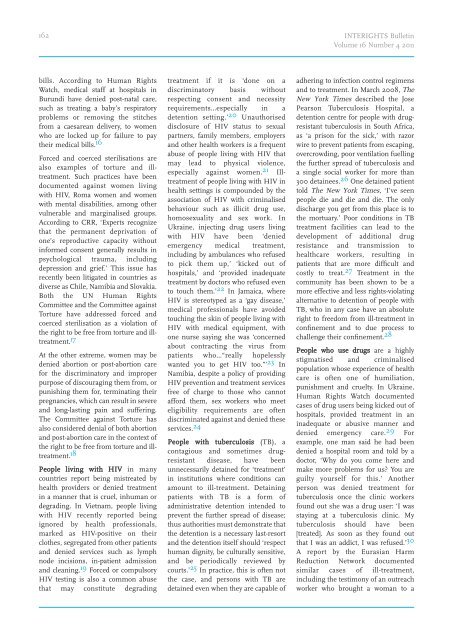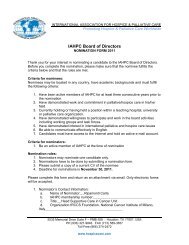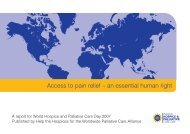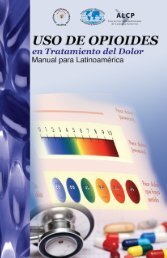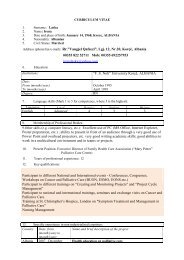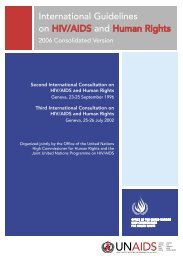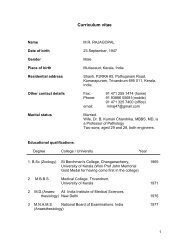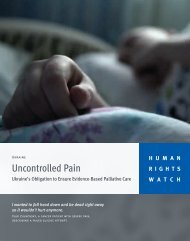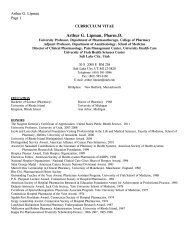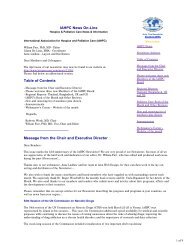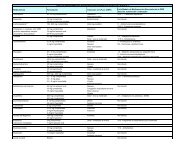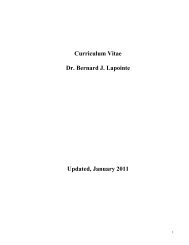INTERIGHTS Bulletin
INTERIGHTS Bulletin
INTERIGHTS Bulletin
Create successful ePaper yourself
Turn your PDF publications into a flip-book with our unique Google optimized e-Paper software.
162<br />
<strong>INTERIGHTS</strong> <strong>Bulletin</strong><br />
Volume 16 Number 4 2011<br />
bills. According to Human Rights<br />
Watch, medical staff at hospitals in<br />
Burundi have denied post-natal care,<br />
such as treating a baby’s respiratory<br />
problems or removing the stitches<br />
from a caesarean delivery, to women<br />
who are locked up for failure to pay<br />
their medical bills. 16<br />
Forced and coerced sterilisations are<br />
also examples of torture and illtreatment.<br />
Such practices have been<br />
documented against women living<br />
with HIV, Roma women and women<br />
with mental disabilities, among other<br />
vulnerable and marginalised groups.<br />
According to CRR, ‘Experts recognize<br />
that the permanent deprivation of<br />
one’s reproductive capacity without<br />
informed consent generally results in<br />
psychological trauma, including<br />
depression and grief.’ This issue has<br />
recently been litigated in countries as<br />
diverse as Chile, Namibia and Slovakia.<br />
Both the UN Human Rights<br />
Committee and the Committee against<br />
Torture have addressed forced and<br />
coerced sterilisation as a violation of<br />
the right to be free from torture and illtreatment.<br />
17<br />
At the other extreme, women may be<br />
denied abortion or post-abortion care<br />
for the discriminatory and improper<br />
purpose of discouraging them from, or<br />
punishing them for, terminating their<br />
pregnancies, which can result in severe<br />
and long-lasting pain and suffering.<br />
The Committee against Torture has<br />
also considered denial of both abortion<br />
and post-abortion care in the context of<br />
the right to be free from torture and illtreatment.<br />
18<br />
People living with HIV in many<br />
countries report being mistreated by<br />
health providers or denied treatment<br />
in a manner that is cruel, inhuman or<br />
degrading. In Vietnam, people living<br />
with HIV recently reported being<br />
ignored by health professionals,<br />
marked as HIV-positive on their<br />
clothes, segregated from other patients<br />
and denied services such as lymph<br />
node incisions, in-patient admission<br />
and cleaning. 19 Forced or compulsory<br />
HIV testing is also a common abuse<br />
that may constitute degrading<br />
treatment if it is ‘done on a<br />
discriminatory basis without<br />
respecting consent and necessity<br />
requirements…especially in a<br />
detention setting.’ 20 Unauthorised<br />
disclosure of HIV status to sexual<br />
partners, family members, employers<br />
and other health workers is a frequent<br />
abuse of people living with HIV that<br />
may lead to physical violence,<br />
especially against women. 21 Illtreatment<br />
of people living with HIV in<br />
health settings is compounded by the<br />
association of HIV with criminalised<br />
behaviour such as illicit drug use,<br />
homosexuality and sex work. In<br />
Ukraine, injecting drug users living<br />
with HIV have been ‘denied<br />
emergency medical treatment,<br />
including by ambulances who refused<br />
to pick them up,’ ‘kicked out of<br />
hospitals,’ and ‘provided inadequate<br />
treatment by doctors who refused even<br />
to touch them.’ 22 In Jamaica, where<br />
HIV is stereotyped as a ‘gay disease,’<br />
medical professionals have avoided<br />
touching the skin of people living with<br />
HIV with medical equipment, with<br />
one nurse saying she was ‘concerned<br />
about contracting the virus from<br />
patients who…“really hopelessly<br />
wanted you to get HIV too.”’ 23 In<br />
Namibia, despite a policy of providing<br />
HIV prevention and treatment services<br />
free of charge to those who cannot<br />
afford them, sex workers who meet<br />
eligibility requirements are often<br />
discriminated against and denied these<br />
services. 24<br />
People with tuberculosis (TB), a<br />
contagious and sometimes drugresistant<br />
disease, have been<br />
unnecessarily detained for ‘treatment’<br />
in institutions where conditions can<br />
amount to ill-treatment. Detaining<br />
patients with TB is a form of<br />
administrative detention intended to<br />
prevent the further spread of disease;<br />
thus authorities must demonstrate that<br />
the detention is a necessary last-resort<br />
and the detention itself should ‘respect<br />
human dignity, be culturally sensitive,<br />
and be periodically reviewed by<br />
courts.’ 25 In practice, this is often not<br />
the case, and persons with TB are<br />
detained even when they are capable of<br />
adhering to infection control regimens<br />
and to treatment. In March 2008, The<br />
New York Times described the Jose<br />
Pearson Tuberculosis Hospital, a<br />
detention centre for people with drugresistant<br />
tuberculosis in South Africa,<br />
as ‘a prison for the sick,’ with razor<br />
wire to prevent patients from escaping,<br />
overcrowding, poor ventilation fuelling<br />
the further spread of tuberculosis and<br />
a single social worker for more than<br />
300 detainees. 26 One detained patient<br />
told The New York Times, ‘I’ve seen<br />
people die and die and die. The only<br />
discharge you get from this place is to<br />
the mortuary.’ Poor conditions in TB<br />
treatment facilities can lead to the<br />
development of additional drug<br />
resistance and transmission to<br />
healthcare workers, resulting in<br />
patients that are more difficult and<br />
costly to treat. 27 Treatment in the<br />
community has been shown to be a<br />
more effective and less rights-violating<br />
alternative to detention of people with<br />
TB, who in any case have an absolute<br />
right to freedom from ill-treatment in<br />
confinement and to due process to<br />
challenge their confinement. 28<br />
People who use drugs are a highly<br />
stigmatised and criminalised<br />
population whose experience of health<br />
care is often one of humiliation,<br />
punishment and cruelty. In Ukraine,<br />
Human Rights Watch documented<br />
cases of drug users being kicked out of<br />
hospitals, provided treatment in an<br />
inadequate or abusive manner and<br />
denied emergency care. 29 For<br />
example, one man said he had been<br />
denied a hospital room and told by a<br />
doctor, ‘Why do you come here and<br />
make more problems for us You are<br />
guilty yourself for this.’ Another<br />
person was denied treatment for<br />
tuberculosis once the clinic workers<br />
found out she was a drug user: ‘I was<br />
staying at a tuberculosis clinic. My<br />
tuberculosis should have been<br />
[treated]. As soon as they found out<br />
that I was an addict, I was refused.’ 30<br />
A report by the Eurasian Harm<br />
Reduction Network documented<br />
similar cases of ill-treatment,<br />
including the testimony of an outreach<br />
worker who brought a woman to a


